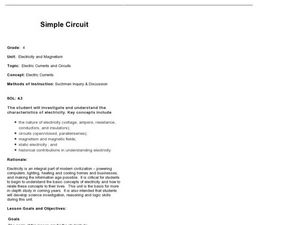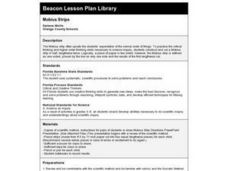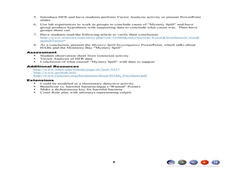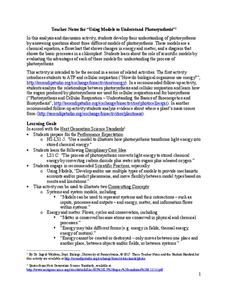Curated OER
Simple Circuit: Electric Currents and Circuits
Through inquiry and exploration, 4th graders will learn and understand the functions of open and closed circuits. They will break into 2 groups, define vocabulary, hypothesize how to light a bulb, then test their hypothesis 4 different...
Science & Plants for Schools
Photosynthesis - A Survival Guide
Young scientists learn what it takes for life on Earth to survive with this series of photosynthesis resources. Offering twelve different activities ranging from independent practice worksheets to in depth scientific experiments, this...
Alabama Wildlife Federation
Leaf Chromatography
Pigmentation of leaves is important in plant processes. Scholars use chromatography to create a better picture of the pigmentation in an assortment of leaves. They share their results to make comparisons between different plant species.
NASA
Introduction: Building Claims from Evidence
Making a claim without supporting it has little value. Learners work on their claim-making skills in a well-designed instructional activity. They view still images from a video and make claims using support from the visual...
Curated OER
Zoom Out
Students explore visual perception and how objects change as distance changes. In this distance and vision lesson, students practice their scientific inquiry skills. Students practice drawing objects from different points of view in...
Intel
Forensics: Get a Clue
Although the methods are all scientific, forensic science was started by police officers rather than scientists, who relied on observation and common sense. Young detectives use many tools to solve crimes around the school in a...
Curated OER
Making Regolith
You may not be able to take a field trip to the moon, but that doesn't mean your class can't study moon rocks. Using graham crackers as the moon's bedrock and powdered donuts as micrometeorites, young scientists simulate the creation of...
American Psychological Association
A Tasty Sample(r): Teaching about Sampling Using M&M’s
Here's a sweet activity! As part of a study of psychological research methods and statistic gathering, individuals develop a hypothesis about the number of each color of M&Ms in a fun-size package. They then count the number of each...
Curated OER
Mythbusters
Eighth graders watch an episode of Mythbusters and answer questions that arise in the video about the scientific process. In this Mythbusters lesson plan, 8th graders complete a scientific investigation based on the video.
Curated OER
Mobius Strips
Students discuss the scientific method and construct their own Mobius Strips. They examine their Mobius Strip, and write observations and a hypothesis on how many strips of paper they have when they cut the strip in half length-wise.
Curated OER
Mystery Spill
Students investigate the cause of birds dying in Monterey Bay. In this scientific research lesson, students use various resources, scientific investigations, and vector analysis to solve an environmental mystery.
Curated OER
Flightless Birds and Scientific Research
Students study the work done by various scientists on Antarctica. In this biology lesson, students play the role of researchers who must justify the importance of their study. They create a multimedia presentation about a specific issue...
Curated OER
Preschoolers and Science Skills
You can encourage critical thinking and problem solving by allowing young children to participate in hands-on science activities.
Curated OER
What Do Scientists Do?
Middle schoolers do a report on distinct scientific fields using the Internet resources provided. They see the connection between what they learn in the classroom and what goes on in the enterprise of science.
Curated OER
Science and the Scientific Process
Young scholars investigate the characteristics of different soil samples. In this physical science lesson, students play the role of forensics solving a crime by matching soil from the suspect's shoes. They formulate a conclusion after...
Curated OER
Forming Open-Ended Questions
Help readers learn to create their own open-ended questions for any text you are working with. Using Bloom's Taxonomy, learners begin on the lower levels and work their way up to form questions that focus on synthesis instead of simple...
NASA
Let's Investigate Mars
Take your science class on a hypothetical field trip to Mars with an engaging astronomy instructional activity. After first learning about NASA's Mars rover missions, young scientists plan their own scientific investigations of Earth's...
NASA
Cleaning Water
From their sweat to the water vapor in their breath, astronauts recycle every possible drop of water while in space. After watching a short video describing the different ways materials are recycled and reused in space shuttles, young...
Curated OER
Global Warming: Writing and Editing a Research Report
Bring environmental issues into your classroom! Practice writing and peer editing research reports on global warming and the greenhouse effect. Middle schoolers can work on their research skills, their writing skills, and how to...
Berkshire Museum
Nature Journaling: Experience the Outdoors Through Writing and Drawing
Step into the great outdoors and develop young scientists' skills of observation with a nature journaling lesson. Given a specific focus or goal, children practice making and recording observations of nature through written descriptions...
Serendip
Using Models to Understand Photosynthesis
Is your class in the dark about photosynthesis? Shed some sunlight on an important biological process with a thoughtful activity. After answering questions to help determine their level of knowledge, learners work with chemical equations...
Curated OER
The Mozart Effect
Music has been said to effect short term memory. Learners test out this hypothesis, graphing how knowledge retention in a biology classroom changes when music is played in the background. In the end, a better appreciation of the dynamics...
Intel
Insects: The Good, The Bad, The Ugly
What would the world be like with no insects? Ponder this question using a research-based STEM unit that encourages scholars to investigate insects from both a beneficial and hazardous perspective. They learn about insect behaviors,...
National History Day
Helping Life and Aiding Death: Science, Technology, and Engineering at Work during World War I
Science, engineering, and United States history? Pupils research collections of artifacts from the Smithsonian to learn about historical scientific innovations. At the end of the lesson, they write an essay to discuss technology's...

























